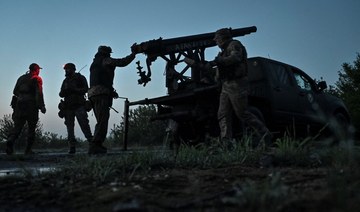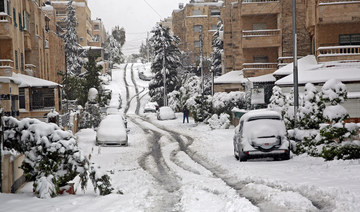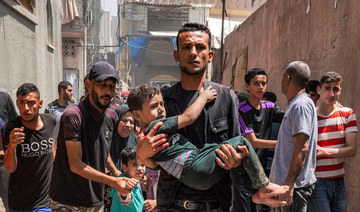NEW DELHI: Bangladesh executed two influential opposition leaders who had been convicted of committing war crimes during the country’s 1971 independence war against Pakistan, a senior jail official said Sunday, despite concerns raised by human rights groups that the legal proceedings that led to the death sentences were flawed.
Bangladesh Nationalist Party (BNP) leader Salahuddin Quader Chowdhury and Jamaat-e-Islami Secretary General Ali Ahsan Mohammad Mujahid were executed at 12:55 a.m. at Dhaka Central Jail in the nation’s capital, Senior Jail Superintendent Mohammad Jahangir Kabir told The Associated Press.
“They have been hanged together, at the same time,” Kabir said.
Security was strengthened near the jail and elsewhere to avoid any violence. A few hours after the execution, a security detail escorted ambulances carrying the men’s bodies to their ancestral homes where their families were to perform the religious burial rituals.
“We have ensured security en route to their homes where they will be buried,” said Munirul Islam, a senior police detective said outside the jail as the ambulances carrying the bodies left the area.
The nation was on high alert in anticipation of the executions. Paramilitary border guards were deployed mainly in the capital, Dhaka, and southeastern district of Chittagong to assist police, a common practice when there is any anticipation of violence.
Following the executions, the Islamist Jamaat-e-Islami party issued a statement calling for a nationwide general strike on Monday.
Mujahid and Chowdhury were convicted and sentenced to death by a special tribunal in 2013 for war crimes committed during the 1971 war. Chowdhury was convicted on of charges of torture, rape and genocide, while Mujahid was found guilty on charges of genocide, conspiracy in killing intellectuals, torture and abduction.
On Wednesday, Bangladesh’s Supreme Court upheld the death sentences against the two men. On Saturday, President Mohammad Abdul Hamid rejected a clemency appeal clearing the way for the executions to proceed, Home Minister Asaduzzaman Khan Kamal said.
The families of Chowdhury and Mujahid met them for the last time inside Dhaka Central Jail on Saturday evening, authorities said.
Jamaat-e-Islami and the Bangladesh Nationalist Party say the trials were politically motivated. Prime Minister Sheikh Hasina, leader of the Awami League party, has denied the allegations. Hasina earlier acknowledged that she faced international pressure for trying opposition figures for war crimes, but vowed to continue the trials “to ensure justice for the families of the slain people” from the 1971 war.
Bangladesh was the eastern part of Pakistan until the 1971 war of independence. The Bangladesh government says that Pakistani soldiers, aided by local collaborators, killed 3 million people and raped 200,000 women during the war.
The Islamist party had campaigned openly against independence and its then chief Ghulam Azam toured the Middle East to campaign against the struggle for independence.
Mujahid , 67, was the head of Islami Chhatra Sangha, then the student wing of the Jamaat-e-Islami party in the eastern part of Pakistan in 1971. He was accused of being the mastermind behind the killing of intellectuals, including teachers and journalists, days before the Pakistani military surrendered to a joint force of freedom fighters and Indian army units on Dec. 16, 1971, after a bloody nine-month war.
Chowdhury, 66, whose father was a Speaker of Pakistan’s National Assembly and at times, the Acting President of Pakistan, also actively opposed Bangladeshi independence. He was accused of carrying out war crimes, including killing more than 200 civilians, mostly minority Hindus, during the independence war, according to evidence presented at the tribunal.
Hasina’s move to try the war crimes suspects has a popular mandate since she pledged to hold such trials during the 2008 election campaign which brought her party to power with an overwhelming majority.
More than 15 people, mostly leaders of Jamaat-e-Islami, have been convicted of war crimes in as series of rulings handed down by two separate tribunals set up by Hasina in 2010. Two senior leaders of Jamaat-e-Islami have already been executed.
US lawmakers overseeing foreign policy described the war crimes tribunal as “very flawed” and a means of political retribution. The State Department was less pointed, saying Friday that executions should not take place until it’s clear the trial process meets international standards.
Stephen Rapp, who until August served as President Barack Obama’s ambassador for war crimes, said it was “disturbing” that Chowdhury was denied the right to call alibi witnesses, including a former US ambassador, to provide testimony that he was not present in Bangladesh at the time the alleged crimes were committed.
Human Rights Watch said the tribunal allowed the prosecution to call 41 witnesses, while Chowdhury’s defense was limited to four witnesses. The New York-based group said Mujahid was sentenced to death for instigating his subordinates to commit abuses, although no subordinates testified or were identified.
Leaders of the House Foreign Affairs Committee, in a letter sent Tuesday to the top US diplomat for South Asia, voiced concern that “democratic space is shrinking” in Bangladesh amid “a growing climate of violence, fear and self-censorship.”
Since February four secular bloggers, a publisher, and two foreigners — an Italian aid worker and a Japanese agriculture researcher — have been killed in attacks linked to Islamic militants.
The Islamic State claimed responsibility for some of the attacks, but authorities say the Sunni extremist group has no presence in the country. Instead, Hasina has blamed the attacks on the Bangladesh Nationalist Party and its main ally, Jamaat-e-Islami, accusing the opposition parties of trying to destabilize the country and halt the war crimes trials. Both opposition parties denied the allegation.
Such extremist violence was once rare in Bangladesh, which is mostly Muslim but has a strong secular tradition.
____
Associated Press writer Matthew Pennington in Washington contributed to this report.
2 Bangladesh opposition leaders executed for war crimes
2 Bangladesh opposition leaders executed for war crimes
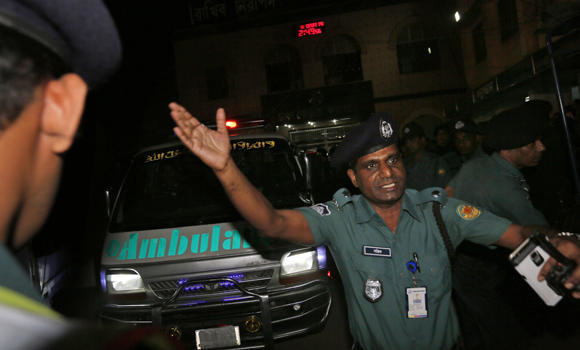
A gunman kills 6 worshippers inside a Shiite mosque in western Afghanistan, the Taliban say
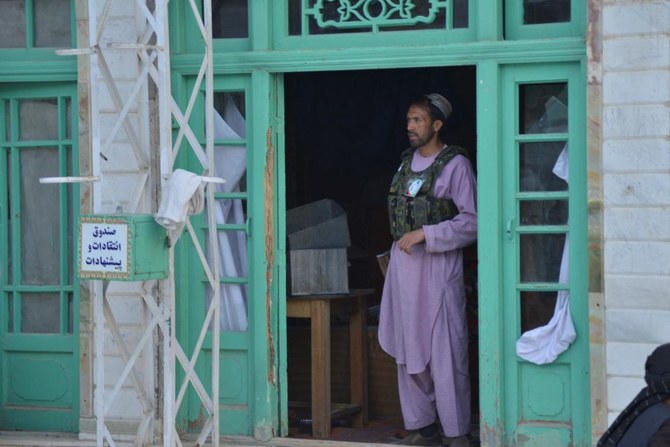
ISLAMABAD: A gunman stormed a mosque in western Afghanistan, opening fire and killing six people as they were praying, a Taliban official said Tuesday.
Local media reports and a former president of Afghanistan said the mosque was targeted because it was a place of worship for the country’s Shiite Muslim minority.
The attack happened on Monday night in the district of Guzara in Herat province, said Abdul Mateen Qani, a spokesman for the Taliban Interior Ministry. He said in a post on the social media platform X that an investigation was underway.
No one immediately claimed responsibility for the attack, which also wounded another worshipper while the attacker fled. Local media reported that the mosque's imam was among those killed.
“I strongly condemn the attack on the Imam Zaman Mosque,” former Afghan President Hamid Karzai said on X. “I consider this terrorist act against all religious and human standards.”
The United Nation Assistance Mission in Afghanistan also condemned the attack, which it said killed and wounded at least seven people, including a child. It called for urgent accountability for perpetrators and protection measures for Shitte communities.
The Islamic State group’s affiliate in Afghanistan is a major Taliban rival and frequently targets schools, hospitals, mosques and Shiite areas throughout the country.
The Taliban seized power in Afghanistan in August 2021, during the last weeks of the chaotic departure of U.S. and NATO troops from the country after 20 years of war.
Despite initial promises of a more moderate stance, the Taliban gradually reimposed a harsh interpretation of Islamic law, or Shariah, as they did during their previous rule of Afghanistan from 1996 to 2001.
Russia says United States is being hypocritical over ICC and Israel
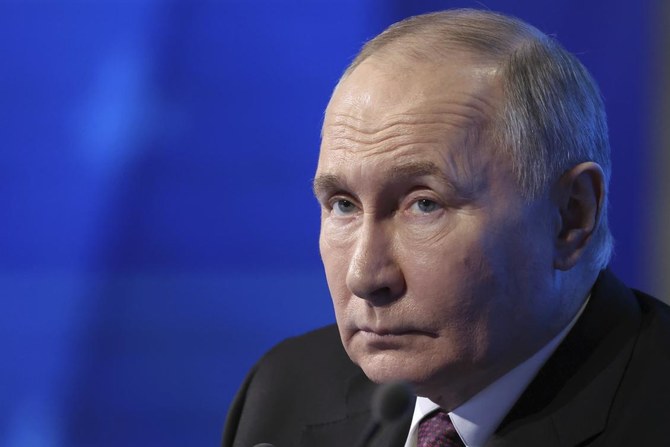
- US President Joe Biden said last year that the ICC decision to issue an arrest warrant for Putin was justified
MOSCOW: Russia said on Tuesday that the United States was being hypocritical by opposing the International Criminal Court’s (ICC) investigation of Israel but supporting the court’s warrant for the arrest of President Vladimir Putin.
The ICC — which can charge individuals with war crimes, crimes against humanity and genocide — is investigating Hamas’ Oct. 7 cross-border attack and Israel’s devastating military assault on Hamas-ruled Gaza, now in its seventh month.
White House spokesperson Karine Jean-Pierre said on Monday the United States did not support the ICC’s investigation of Israel and did not believe that the court had jurisdiction.
US President Joe Biden said last year that the ICC decision to issue an arrest warrant for Putin was justified. The United States has shared details of alleged Russian war crimes in Ukraine with the ICC.
Russia says the warrant against Putin is a meaningless attempt by the West to soil Russia’s reputation and denies war crimes in Ukraine. Ukraine says Russia committed war crimes. Russia says the West has ignored Ukraine’s crimes, a charge denied by Kyiv.
“Washington fully supported, if not stimulated, the issuance of ICC warrants against the Russian leadership,” Russian Foreign Ministry spokesperson Maria Zakharova said in a post on Telegram.
But “the American political system does not recognize the legitimacy of this structure in relation to itself and its satellites,” Zakharova said, adding that such a position was intellectually “absurd.”
The Kremlin has called the issuing of the warrant against Putin outrageous and legally void, as Russia is not a signatory to the treaty that created the ICC.
Israel is not a member of the ICC, while the Palestinian territories were admitted as a member state in 2015.
Prime Minister Benjamin Netanyahu said on Friday that any ICC decisions would not affect Israel’s actions but would set a dangerous precedent.
Israeli officials are worried that the court could issue arrest warrants against Netanyahu and other top officials for alleged violations of international humanitarian law in Gaza, Israeli media have reported.
They said the ICC is also considering arrest warrants for leaders from Hamas.
London police arrest sword-wielding man after reports of stabbing
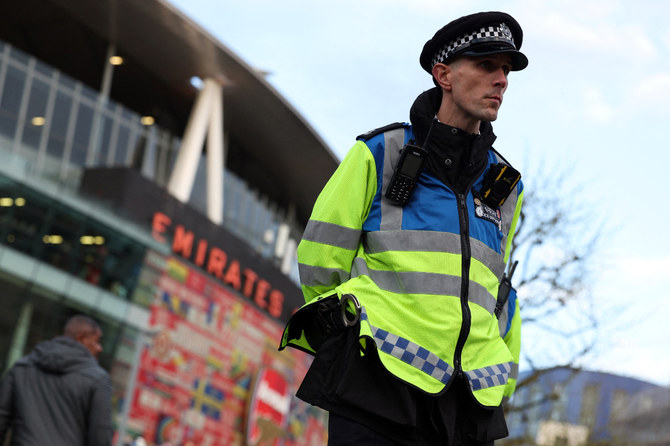
- Police said the suspect had attacked members of the public and two officers
LONDON: British police have arrested a man armed with a sword following reports of people having been stabbed during a serious incident in northeast London although it was not thought to be terrorism-related, the capital’s police force said on Tuesday.
The 36-year old man was arrested after police were called to reports of a vehicle being driven into a house in the area close to Hainault train station, the Metropolitan Police said in a statement.
Police said the suspect had attacked members of the public and two officers.
“This must have been a terrifying incident for those concerned. I know the wider community will be feeling shock and alarm,” Metropolitan Police Deputy Assistant Commissioner Ade Adelekan said. “We do not believe there is any ongoing threat to the wider community.”
The force said the incident did not appear to be terror-related and they were not looking for further suspects.
“I am being regularly updated about the incident at Hainault Station this morning,” Britain’s interior minister James Cleverly said on X. “My thoughts are with those who have been affected.”
Gunman kills six in attack on Afghan mosque – Taliban spokesman
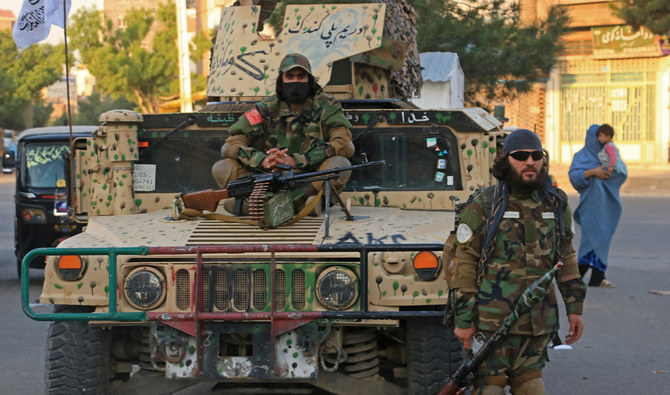
- Locals say the mosque served the minority Shiite community just south of the Afghan city of Herat
- While no group has claimed the attack, the regional chapter of Daesh is viewed as threat in Afghanistan
HERAT: A gunman stormed a mosque in western Afghanistan and killed six people, a government spokesman said Tuesday, with local residents claiming the minority Shiite community had been targeted.
Interior ministry spokesman Abdul Mateen Qani said that “an unknown armed person shot at civilian worshippers in a mosque” in Herat province’s Guzara district on Monday at around 9:00 p.m. (1630 GMT).
“Six civilians were martyred and one civilian was injured,” he wrote on social media platform X early Tuesday morning.
Locals said the mosque served the minority Shiite community in a district just south of the provincial capital of Herat city, and the imam and a three-year-old child were among those killed.
They also said a team of three gunmen staged the attack, contradicting the official account.
“One of them was outside and two of them came inside the mosque, shooting the worshippers,” said 60-year-old Ibrahim Akhlaqi, the brother of the slain imam. “It was in the middle of the prayers.”
“Whoever was in the mosque has either been martyred or wounded,” added 23-year-old Sayed Murtaza Hussaini.
While no group has claimed the attack, the regional chapter of Daesh is the largest security threat in Afghanistan and has frequently targeted Shiite communities.
The Taliban government has pledged to protect religious and ethnic minorities since returning to power in August 2021, but rights monitors say they’ve done little to make good on that promise.
The most notorious attack linked to Daesh since the Taliban takeover was in 2022, when at least 53 people — including 46 girls and young women — were slain in the suicide bombing of an education center.
Taliban officials blamed Daesh for the attack, which happened in a Shiite neighborhood of the capital Kabul.
Afghanistan’s new rulers claim to have ousted Daesh from the country and are highly sensitive to suggestions the group has found safe haven there since the withdrawal of foreign forces.
Taliban authorities have frequently given death tolls lower than other sources after bombings and gun attacks, or otherwise downplayed them, in an apparent attempt to minimize security threats.
A United Nations Security Council report released in January said there had been a decrease in Daesh attacks in Afghanistan because of “counter-terrorism efforts by the Taliban.”
But the report said Daesh still had “substantial” recruitment in the country and that the militant group had “the ability to project a threat into the region and beyond.”
Daesh chapter spanning Afghanistan, Pakistan and Central Asia claimed responsibility for the March attack on the Crocus City Hall concert venue in Moscow, killing more than 140 people.
It was the deadliest attack in Russia in two decades.
China says Palestinian rivals Hamas and Fatah met for talks in Beijing
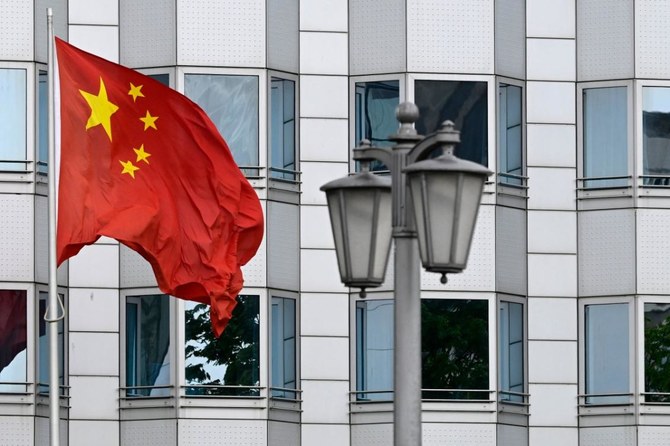
BEIJING: China said Tuesday that rival Palestinian groups Hamas and Fatah met in Beijing recently for “in-depth and candid talks on promoting intra-Palestinian reconciliation.”
“Representatives of the Palestine National Liberation Movement and the Islamic Resistance Movement recently came to Beijing,” foreign ministry spokesman Lin Jian said, referring to the groups by their formal names.
“The two sides fully expressed their political will to achieve reconciliation through dialogue and consultation, discussed many specific issues and made positive progress,” he added, without specifying when the sides had met.
Islamist movement Hamas seized control of the Gaza Strip in 2007 after ferocious fighting with its rivals in Fatah, which maintains partial administrative control in the Israeli-occupied West Bank through the Palestinian Authority.
China has historically been sympathetic to the Palestinian cause and supportive of a two-state solution to the Israeli-Palestinian conflict.
Beijing has been calling for an immediate ceasefire since the start of the current Israel-Hamas war in October last year, when attacks by the militant group resulted in the deaths of about 1,170 people in Israel, mostly civilians, according to an AFP tally based on Israeli official figures.
Israel’s retaliatory offensive has killed at least 34,535 people in the Gaza Strip, mostly women and children, the health ministry in the Hamas-run territory said on Tuesday.
Beijing said on Tuesday the two factions had “agreed to continue this process of dialogue with a view to achieving Palestinian unity at an early date.”
“The two sides highly appreciated China’s firm support for the just cause of the Palestinian people to restore their legitimate national rights,” Lin said.
He did not identify the representatives from Hamas and Fatah who met in Beijing.
Chinese President Xi Jinping has called for an “international peace conference” to resolve the fighting.
In November, Beijing hosted a delegation of diplomats from Arab and Muslim-majority nations, in which Foreign Minister Wang Yi warned a “humanitarian disaster” was unfolding in Gaza.


